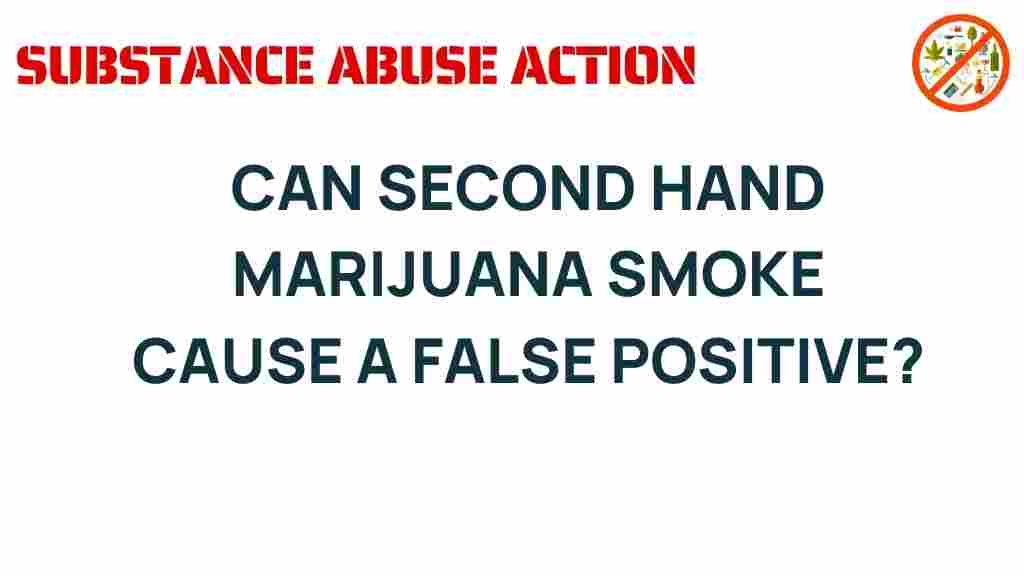Can Secondhand Marijuana Smoke Lead to False Positives in Drug Tests?
The debate around marijuana use has intensified in recent years, especially with the increasing legalization of cannabis in various regions. As more people are exposed to cannabis, a pertinent question arises: Can secondhand marijuana smoke lead to false positives in drug tests? Understanding this issue is crucial for individuals who may face drug testing in workplace or legal settings, as well as for those concerned about the health implications of cannabis exposure.
Understanding Secondhand Marijuana Smoke
Secondhand marijuana smoke refers to the smoke that is exhaled by a person who is smoking cannabis or that comes from the burning end of a marijuana cigarette, blunt, or other smoking device. This smoke contains various compounds, including tetrahydrocannabinol (THC), the primary psychoactive component of cannabis.
Here are some key points about secondhand marijuana smoke:
- Contains THC and other cannabinoids.
- Can be inhaled by individuals nearby, even if they are not actively smoking.
- Exposure levels can vary based on ventilation, the amount of cannabis being consumed, and duration of exposure.
How Drug Testing Works
Drug tests, particularly urine tests, are designed to detect the presence of specific substances, including THC. These tests typically have a threshold level for what constitutes a positive result. If THC metabolites are present above this threshold, the test will return a positive result.
Can Secondhand Marijuana Smoke Cause False Positives?
Research indicates that exposure to secondhand marijuana smoke can lead to THC being detected in the body, but the likelihood of this resulting in a false positive on a drug test is complex and dependent on several factors:
- Duration of Exposure: The longer a person is exposed to secondhand smoke, the higher the likelihood of THC accumulation.
- Concentration of Smoke: Enclosed spaces with high concentrations of smoke increase the chances of drug detection.
- Individual Metabolism: Different individuals metabolize THC at different rates, influencing test results.
In studies where participants were exposed to significant secondhand marijuana smoke, some tested positive for THC. However, these individuals were typically in environments with high levels of smoke, such as confined spaces without ventilation.
Health Risks Associated with Secondhand Marijuana Smoke
Beyond the implications for drug testing, there are health risks associated with secondhand marijuana smoke exposure. Similar to tobacco smoke, inhaling marijuana smoke can have potential adverse effects:
- Respiratory issues, such as coughing and wheezing.
- Increased heart rate and blood pressure.
- Potential for addiction in susceptible individuals.
It’s important to consider these health risks, especially for vulnerable populations, including children and individuals with pre-existing health conditions.
Workplace Policies and Legal Implications
Many workplaces have policies regarding drug use, and employees may be subjected to random drug testing. Understanding the legal implications of secondhand marijuana smoke is vital for both employers and employees.
- Workplace Policies: Employers may need to consider whether their policies account for the potential effects of secondhand marijuana smoke.
- Legal Implications: Employees who test positive for THC due to secondhand exposure may face disciplinary action, even if they did not use cannabis themselves.
For more information on workplace policies related to drug testing, visit this resource.
Step-by-Step Process: How to Mitigate Risks
To minimize the risk of false positives from secondhand marijuana smoke, there are several steps individuals can take:
- Avoid Enclosed Spaces: Steer clear of areas where cannabis is being smoked, especially in poorly ventilated rooms.
- Communicate with Others: If you are in a social setting where cannabis is being consumed, inform others of your concerns about exposure.
- Consider Alternatives: If you are in a place where smoking is common, such as a party, consider stepping outside or into a well-ventilated area.
- Know Your Rights: Familiarize yourself with workplace policies regarding drug testing and the legal implications of secondhand exposure.
Troubleshooting Tips for Drug Testing Concerns
If you are concerned about the possibility of a false positive due to secondhand marijuana smoke, here are some troubleshooting tips:
- Keep Records: Document instances where you may have been exposed to secondhand marijuana smoke, including dates and locations.
- Seek Professional Advice: If you have a drug test coming up and are worried about exposure, consider consulting a healthcare professional or a legal advisor.
- Request a Retest: If you test positive and believe it is due to secondhand smoke, inquire about the possibility of a retest or a more accurate testing method.
Conclusion
In conclusion, while secondhand marijuana smoke can lead to the presence of THC in the body, the likelihood of this resulting in false positives on drug tests is influenced by various factors, including exposure duration and smoke concentration. It’s crucial to understand the health risks associated with secondhand smoke, as well as the implications for workplace policies and legal scenarios.
As cannabis continues to become more widely accepted and legalized, awareness of these issues will be essential for both users and non-users of cannabis. By taking proactive measures and understanding your rights, you can better navigate the complexities associated with secondhand marijuana smoke and drug testing.
For more insights on cannabis exposure and its effects, check out this article.
This article is in the category Health and created by SubstanceAbuseAction Team
